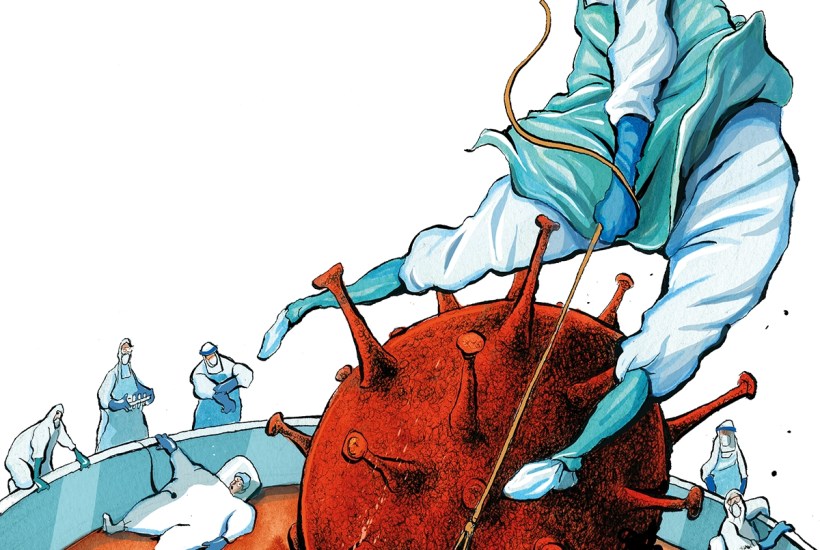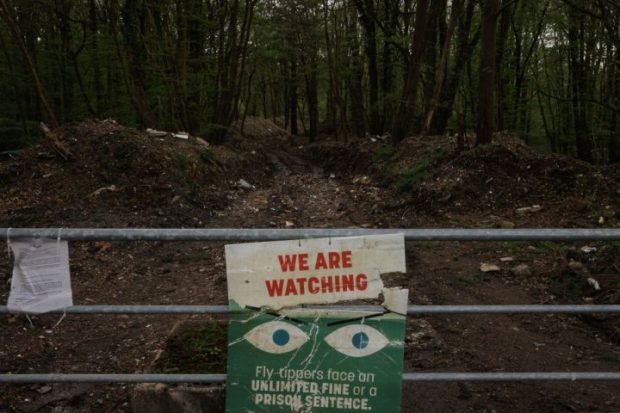Look, I don’t know much epidemiology. Can’t pretend to. So what follows is, necessarily, a personal finger to the wind. But perhaps it chimes with your experience.
First time round — back in the days when we were all huddled indoors, leaving the house only to stand on the doorstep of a Thursday night to bang pans with a wooden spoon, or making solo expeditions to a denuded supermarket where we do-si-dohed around each-other in the aisles… yes, back in those days, I didn’t know very many people who got Covid. Acquaintances, the odd friend. Some scary stories. Some scarier statistics. But not so many ‘rona stricken friends.
In the month or two since we’ve informally decided that Covid is last year’s story, though, they’ve been dropping like flies. Within about 48 hours my brother, mother, nephew and father came down with it (my dad was hospitalised); about half a dozen friends likewise. On Saturday I had to step in last-minute to chair an extra event at the Cliveden Literary Festival because the colleague who was supposed to chair it had tested positive. (‘Welcome to the Cliveden super-spreader event,’ I greeted the audience; it got an uneasy laugh but it may turn out to have been in bad taste.)
The many adults who are getting Covid, including my wife and my father, were fully vaccinated; so there’s that. Kate Bingham, head of the vaccine task force, was at Cliveden with me, and I regret not having got the chance to shake her hand, or at least elbow-bump her: she probably saved my father’s life. But helpful though the vaccines are, they are, as philosophers might say, necessary but not sufficient.
Ever more often, I find myself humming the catchy tune from Team America: World Police: ‘Everyone Has AIDS.’ It’s almost as if lockdowns and social distancing, masks in shops and on public transport, had an effect on transmission. It’s almost like deciding Covid was over and doing the opposite, well, stopped it being over. The plural of anecdote is not data, as smart-arses on the internet like to say. So, sure. There’s data, too. Weekly hospital admissions have more than quadrupled since June. We have more than 40,000 daily cases; Germany, second in the Euro league table, is a bit shy of 9,000. Our lackadaisical approach to vaccinating teens means that Covid has been ripping through schools. And as even the non-epidemiologists among us will by now understand, the thing about figures like this is — in the absence of a change in the way people behave — they only go one way, which is up, and with the increasing speed that is the inexorable hallmark of an exponential function.
There are points to make about this in mitigation. The first and best — and the one that is no doubt guiding the fingers-crossed, squeaky-bum time attitude at No. 10 — is that vaccines mean that even if the disease is spreading, it’s no longer killing people off at nearly the rate it did before we were all vaccinated. Could we inch towards herd immunity down a road scattered with corpses rather than heaped with them? It sounds callous but — with real, material, non-trivial costs to tightening the rules again — that is essentially the calculus.
The government has other side-effects to consider: political ones. The PM’s libertarian instinct and love of the feelgood factor will strongly incline him against tightening the rules until he absolutely has to. Another Covid-restricted Christmas would be a giant bummer for everyone. And now that the virus has been so thoroughly and frivolously folded into the culture wars, mask refusal has become a political virility test. Jacob Rees-Mogg’s joshing that ‘convivial’ relations with his colleagues means that mask-wearing in the Commons isn’t necessary is only the crass version of Rishi Sunak’s brushing aside the question by waffling about people making ‘the right judgment’. There are proud libertarians to be kept on side.
So we can all understand why the government is reluctant to do anything until it absolutely has to. But, to repeat, these graphs only go one way; and they go that way with increasing speed. Which means — another lesson we have learned not once but twice before now — by the time you absolutely have to clamp down, you’re clamping down too late. It takes longer, it hurts the economy more, and more people get ill and die.
No. 10 loves to say it’s ‘following the science’ — but the number of named authorities saying ‘let’s wait and see’ would struggle to make up a bridge four. The British Medical Association, meanwhile, has issued a statement to the effect that the best time to activate Plan B is two weeks ago and the second best time is now. What’s that saying about having the serenity to accept the things you cannot change, the courage to change the things you can, and the wisdom to know the difference? That. Let’s get on with it.
Got something to add? Join the discussion and comment below.
Get 10 issues for just $10
Subscribe to The Spectator Australia today for the next 10 magazine issues, plus full online access, for just $10.





















Comments
Don't miss out
Join the conversation with other Spectator Australia readers. Subscribe to leave a comment.
SUBSCRIBEAlready a subscriber? Log in